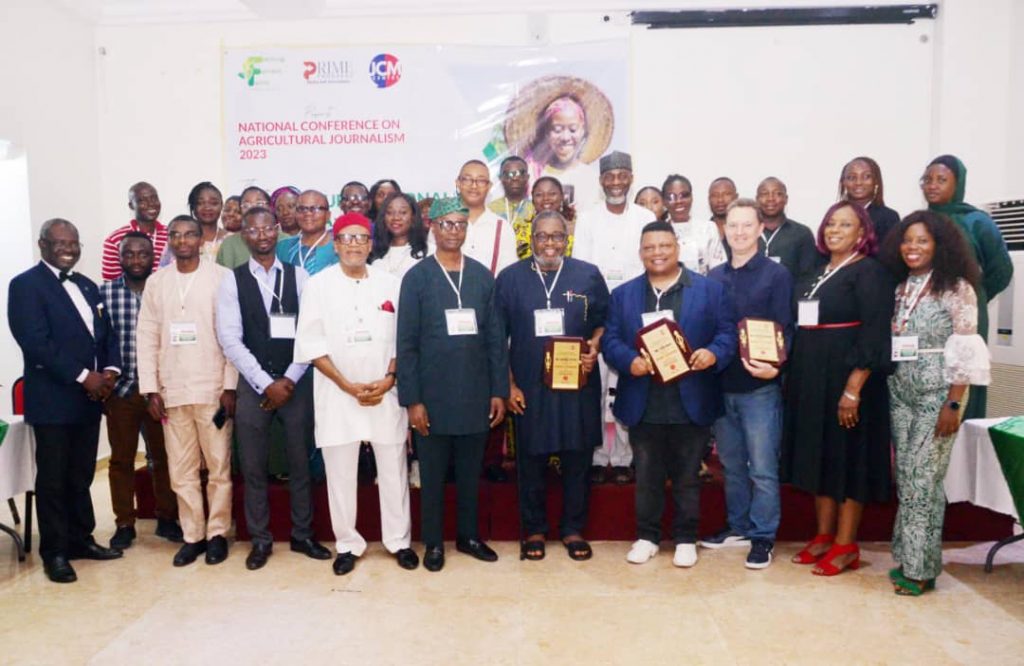By Franklin Ogude

The need for Development Journalism and Communications can’t be more auspicious now in Nigeria than any other time especially in the nation’s agricultural sector which fertilizes the survival of the people.

Lately there have been growing concerns for food insecurity because of numerous factors which include inflation, transportation cost prompted by fuel subsidy removal, volatility in the forex market, security challenge in some parts of the North, all of which make the challenge two-fold- food affordability and accessibility.
The over-dependence of Nigeria on import instead of export is one red-flag in the development profile of the nation that the agriculture revolution is being looked upon to correct.

These gaps and many others are the compelling impetus driving the exigency of agricultural communication and journalism.
Consequently, some stakeholders and journalists staged a two-day National Conference on Agricultural Journalism which held 31st August on and 1st September,2023 in Abuja.
The conference looked at improving reportage on agriculture for impact on the society but highlighted lack of funds for investigative reporting, non-disclosure of developments by stakeholders, lack of skills and interest by practicing journalists as some challenges against effective agricultural journalism.
The participants at the panel session,held that “Agric sustains us; nourishes us, heals us, etc.” Agriculture is said have generated 21% of the country’s GDP in 2015, it is one of her oldest industries and offers almost one-third of her employment amongst others.
Agricultural journalism, therefore is that aspect of journalism aimed at showcasing the benefits and challenges the agricultural sector faces in Nigeria.
In his keynote address Dr. Olufemi . Oladunn; Executive Director/ CEO, Agricultural and Rural Management Training Institute (ARMTI) said “I am convinced and happy to note that journalism possesses enormous potential to initiate and effect tangible changes and improvements in any human society. Given the humungous agriculture-enabling natural resources Nigeria is endowed with and the apparent underperformance of the nation’s agricultural sector, agricultural journalism has an incredibly large space to thrive and impact the sector positively”.
Dr. Olufemi also pointed out that agriculture needs to be made more attractive, especially, for youths in the country who seem to be unconcerned and not interested in the business of food production.
According to him, “Innovative means must be deployed to arouse their interest in agriculture through the development and dissemination of inspiring content on modern agricultural practices and technologies that assure higher productivity and higher returns on investment. Such modern agricultural practices and technologies include soilless agriculture, urban farming, agroecological practices, climate-smart agricultural practices, precision agriculture and other applications of artificial intelligence in agriculture, greenhouse and screen house crop production technologies, etc.
He didn’t fail to admonish them to take agricultural journalism to the next level by being the voice of the agriculture sector in the larger society.
In his paper, “Mainstreaming Value-Chain Approach to Agriculture Reporting,” Mr. Obinna Chukwuezie, an agricultural journalism trainer and communication expert, noted that the agricultural journalist also covers all interactions in the chain block of the production and distribution process, adding that effective reportage on this beat requires basic knowledge of agriculture, business, politics, technology, and public policy on the food system.
He said some of the issues encountered in the value chain include but are not limited to water, infrastructure, modern technology, climate, socio-political issues affecting farmers, et cetera. Some journalists are also faced with poor reportage skills, lack of detailed information from farmers, poor knowledge of the concept, fear of being oppressed by the affected agencies or bodies, delay from scientists and lots more. These reporters can do better in the effective delivery of their jobs by meticulously tackling all these.
According to Chukwuezie, there are four key objectives effective agricultural reportage should tackle .There are; food security, import substitution, job creation and economic diversification.
He said some projects like FADAMA, and APPEALS, are funded by the World Bank and International Fund for Agricultural Development (IFAD) to help raise the ban. If more focus is laid on this area, it will yield more results by preventing pest and crop diseases, and increasing farm produce with modernized machines which is evident as Nigeria is one of the highest producers of cassava in the world, ranked as the 6th worldwide and first in Africa for farm produce.
Food for Mzansi, an African media company, highlighted some insight into their approach to agricultural journalism which includes connecting the urban and rural world, disseminating accessible and actionable information, nurturing the next generation, and driving policy and advocacy amongst others. They didn’t fail to blot out some pivotal roles plays in agriculture which are not limited to instantaneous and simultaneous dissemination of information to be ubiquitous, fighting misinformation and engaging farmers, both small, large scale and the society interactively.
 MMS PLUS NG – Maritime, Aviation, Business, Oil and Gas News Online Newspaper with coverage in Maritime, Oil and Gas, Aviation, Power and Energy as well as Financial News
MMS PLUS NG – Maritime, Aviation, Business, Oil and Gas News Online Newspaper with coverage in Maritime, Oil and Gas, Aviation, Power and Energy as well as Financial News









